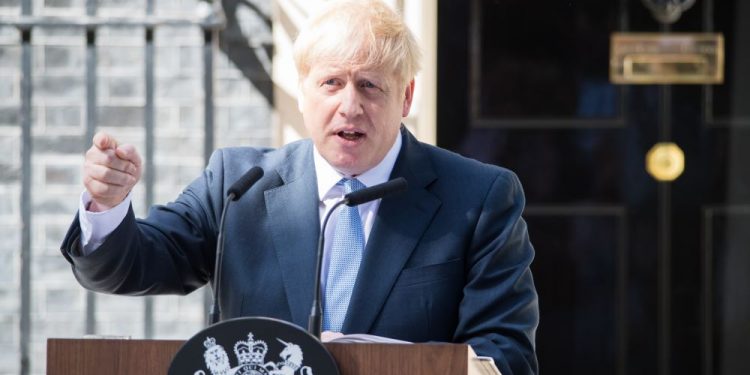-
UK government announces new tax to fund the NHS, social care services

The Xinhua reported, The British government announced on Tuesday a new tax to fund Britain's National Health Service (NHS) and adult social care services as the COVID-19 pandemic has illuminated chronic problems in its health and social care system and made many of them worse.
The Chinese news agency said, British Prime Minister Boris Johnson said in the House of Commons, lower house of the British parliament, the government will create a 1.25 percent Health and Social Care Levy across the country on earned income, with dividends rates increasing by the same amount, effective from next April.
Johnson told the lawmakers: "So today we are beginning the biggest catch-up programme in NHS history, tackling the COVID backlogs by increasing hospital capacity to 110 percent, and enabling 9 million more appointments, scans and operations."
According to the Xinhua, he said this will raise almost 36 billion pounds (about 49.7 billion U.S. dollars) over the next three years, with money from the levy going directly to health and social care across the whole country.

He said from October 2023 no-one starting care will pay more than 86,000 pounds (118,965 dollars) over their lifetime, and no-one with assets of less than 20,000 pounds (27,666 dollars) will have to make any contribution from their savings or housing wealth, up from 14,000 pounds (19,366 dollars) today.
Johnson admitted no Conservative government wants to raise taxes and this breaks a manifesto commitment.
"But a global pandemic was in no-one's manifesto," he said, adding that people in this country understand that in their bones and they can see the enormous debts the government has taken.
Jeremy Hunt, a Conservative MP, hailed the government for "taking a tough and politically difficult" decision to give the NHS and social care desperately needed funding and that is also a big step forward in protecting families from catastrophic care costs.
Hunt tweeted: "For a Conservative government, raising taxes is always a last resort. We know public services are not just about funding, but standards too. But no government that wants decent healthcare can ignore demographic reality, so today's changes will command support despite general unpopularity of tax rises."
Meanwhile, Margaret Hodge, a Labour MP, criticized the prime minister for failing to truly explain how he will fix the broken social care system, calling his plan a sticking plaster and the funding behind it is one of the least progressive options.
"It's unfair between generations, individuals, and those who derive income from assets or work," Hodge wrote on Twitter.
During a press conference at Downing Street later Tuesday, Johnson answered a question about the fairness of the new measures, which will allegedly tax poorer people while wealthy pensioners' homes and assets are protected.
Read more: Canadian Prime Minister hit by stones during campaign stop
Johnson claimed that the measures are "progressive and broad-based" as the wealthiest 14 percent of the population will take half of the total tax burden.
Chancellor of the Exchequer Rishi Sunak admitted that there is no "perfect or easy way" to raise the money needed to fix the health and social care crisis.
Asked about his decision to break his election manifesto, Johnson said: "Nobody likely wants to raise taxes. But the fact is that nobody in any manifesto that I read saw a pandemic coming in which the country had to spend many 407 billion pounds (561.2 billion dollars) putting us in a fiscally very difficult situation."
He said he had to make a judgment about what is a higher priority. "I think the NHS is our national priority," he added.
The need to treat COVID patients has contributed to worsening wait times for non-COVID care in Britain.
Government statistics show before the pandemic, nine out of 10 were waiting fewer than 25 weeks in England, but that has now risen to 44 weeks. The number of NHS patients waiting for tests, surgery and routine treatment in England is at a record high of 5.5 million and could potentially reach 13 million over the next few years.
Source: xinhua
You May Also Like
Popular Posts
Caricature
BENEFIT Sponsors BuildHer...
- April 23, 2025
BENEFIT, the Kingdom’s innovator and leading company in Fintech and electronic financial transactions service, has sponsored the BuildHer CityHack 2025 Hackathon, a two-day event spearheaded by the College of Engineering and Technology at the Royal University for Women (RUW).
Aimed at secondary school students, the event brought together a distinguished group of academic professionals and technology experts to mentor and inspire young participants.
More than 100 high school students from across the Kingdom of Bahrain took part in the hackathon, which featured an intensive programme of training workshops and hands-on sessions. These activities were tailored to enhance participants’ critical thinking, collaborative problem-solving, and team-building capabilities, while also encouraging the development of practical and sustainable solutions to contemporary challenges using modern technological tools.
BENEFIT’s Chief Executive Mr. Abdulwahed AlJanahi, commented: “Our support for this educational hackathon reflects our long-term strategic vision to nurture the talents of emerging national youth and empower the next generation of accomplished female leaders in technology. By fostering creativity and innovation, we aim to contribute meaningfully to Bahrain’s comprehensive development goals and align with the aspirations outlined in the Kingdom’s Vision 2030—an ambition in which BENEFIT plays a central role.”
Professor Riyadh Yousif Hamzah, President of the Royal University for Women, commented: “This initiative reflects our commitment to advancing women in STEM fields. We're cultivating a generation of creative, solution-driven female leaders who will drive national development. Our partnership with BENEFIT exemplifies the powerful synergy between academia and private sector in supporting educational innovation.”
Hanan Abdulla Hasan, Senior Manager, PR & Communication at BENEFIT, said: “We are honoured to collaborate with RUW in supporting this remarkable technology-focused event. It highlights our commitment to social responsibility, and our ongoing efforts to enhance the digital and innovation capabilities of young Bahraini women and foster their ability to harness technological tools in the service of a smarter, more sustainable future.”
For his part, Dr. Humam ElAgha, Acting Dean of the College of Engineering and Technology at the University, said: “BuildHer CityHack 2025 embodies our hands-on approach to education. By tackling real-world problems through creative thinking and sustainable solutions, we're preparing women to thrive in the knowledge economy – a cornerstone of the University's vision.”
opinion
Report
ads
Newsletter
Subscribe to our mailing list to get the new updates!






















